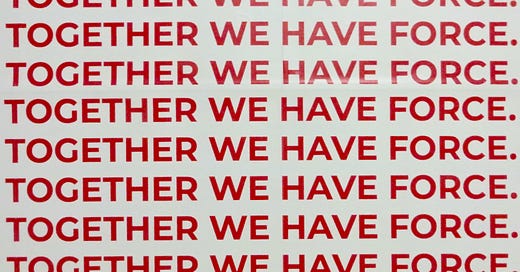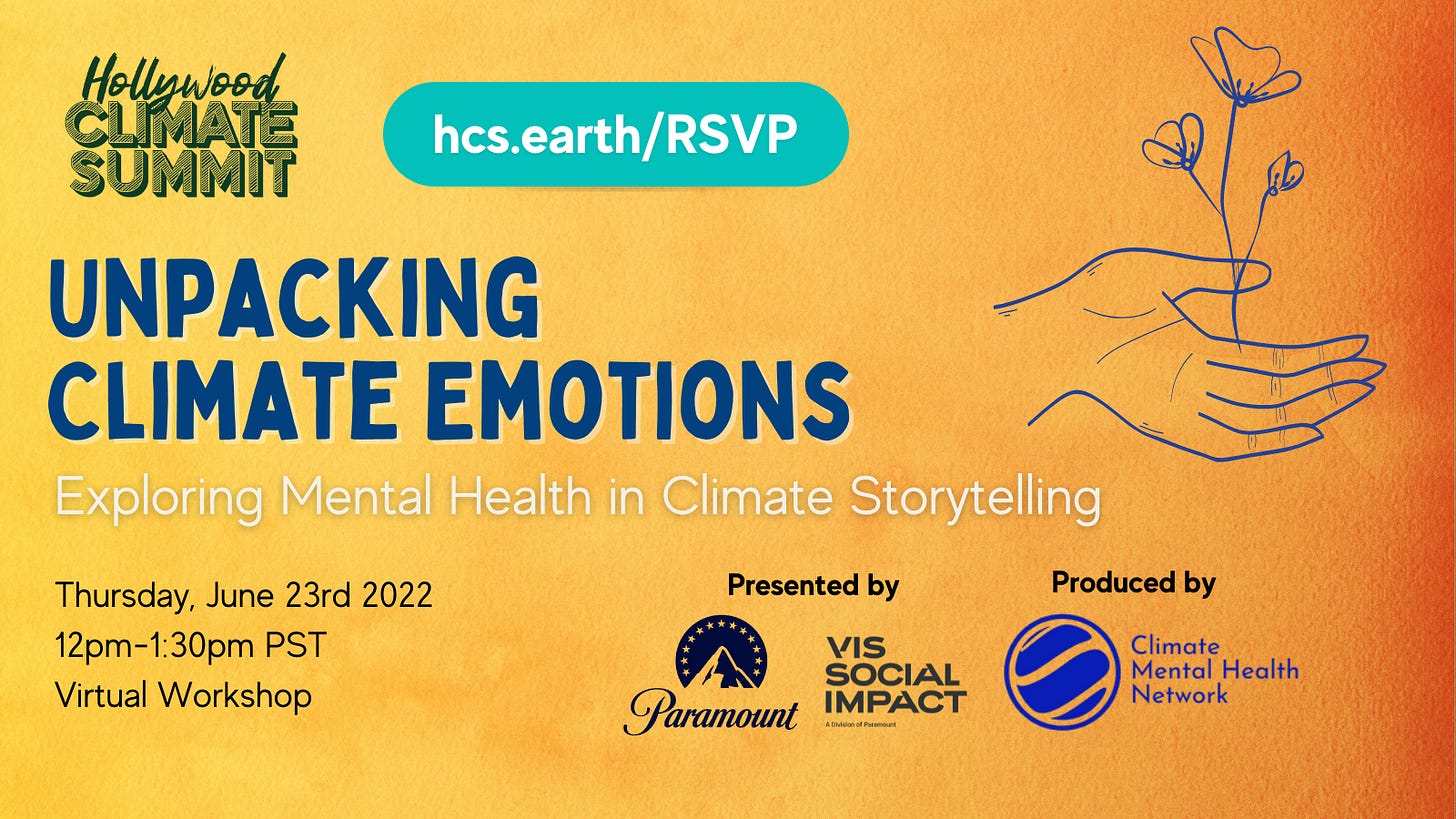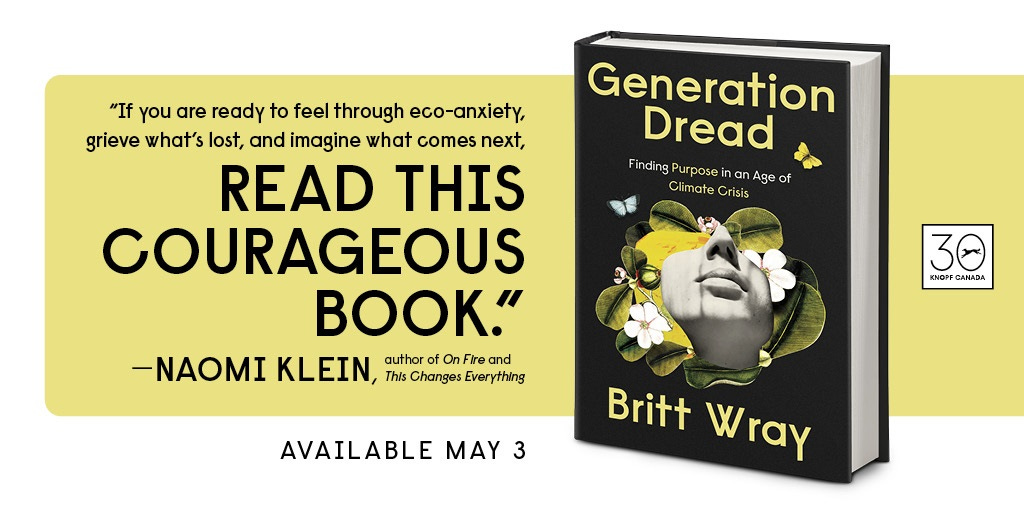The uncanny power of learning to live with the climate crisis
What it means to 'bear worlds' of climate distress and empowerment at the same time
Hey there!
I want to welcome a bunch of new people who’ve subscribed in recent days, thanks for joining us here as we take on the psychological dimensions of the climate and ecological crisis! That said, if you haven’t subscribed yet, you can do so here:
What’s on deck today:
‘Learning to live with climate change’ with Blanche Verlie
Kim Stanley Robinson’s reflections on Ministry for the Future
Have your say - what do you want to get out of the Gen Dread community?
Community announcements and upcoming tour dates
Let’s get to it!
‘Learning to live with climate change’ with Blanche Verlie
Photo by Bekky Bekks on Unsplash
While writing Generation Dread, I came across the work of a very interesting Australian scholar named Dr Blanche Verlie who studies the political implications of challenging climate emotions. I was particularly taken with her concept of ‘bearing worlds’, which is what she argues a full on confrontation with climate distress can enable. Verlie articulates how an affective reckoning with the crisis can lead a person towards 2 simultaneous modes of change: 1) bearing the transformation of their own internal world that is deeply altered once they have engaged with the traumatic content of the climate crisis, and 2) bearing the work of what it takes to generate a more promising and life sustaining future while enduring the hard truths of what climate science has to tell us about the very future we are moving towards (given the costs of historic and current inaction). It’s a dynamic process of enduring distress and empowering agency at the same time, which is what it means to learn to live with climate change (and what my personal experience has taught me too).
Luckily for us, Verlie has written extensively about this process based on her observations as a climate educator and scholar, in an open source book. You can download Learning to Live with Climate Change: From Anxiety to Transformation here. What’s special about this book, besides its nuanced, critical content (for example, referring to the growing field of climate mental health she writes “I worry that a focus on emotional resilience risks re-centring the individual human – normally privileged ones – and breeding acceptance in place of outraged inspiration”), is Verlie’s use of poetic and theoretical language without losing the reader in incomprehensible jargon.
Her writing grabs us on a sensual level, to make us smell, touch and feel her points. There’s a politics to her writing that tells us to get out of our heads and into our bodies. To know the climate crisis is to feel it clogging our lungs and stinging our eyes, and to respond to it means envisioning oneself as part of a ‘cloudy collective’ — ephemeral aggregates of different kinds of people, whose mixed stories create a stronger climate movement precisely because there is no central coordination, and all stories, fluctuations, and dispersions are allowed. The key is that the collective becomes voluminous and diverse. To thrive in the climate crisis therefore means to be in the business of seeding clouds.
The main point of the book, I would argue, is to correct the overemphasis on emotional resilience by presenting alternative ways to cultivate strength that are at once cultural, emotional and interpersonal. Verlie concludes by making pragmatic suggestions to educators, activists, and facilitators about what they can do to assist people in their own process of ‘affective transformation’ as they ‘learn to live with climate change’. A lot of this comes down to finding ways to bear the discomfort of sitting with people in their anguish, helping them to tolerate it even as it may feel intolerable to oneself, and allowing that form of support to unleash new creative capacities for moving beyond helplessness or denial, and stepping into agency, power and action.
Verlie writes, “We need to dwell with the unjust histories, uncomfortable presents, and uncontrollable futures that we are unavoidably enmeshed with, so as to inspire alternative modes of being. Doing this is immensely challenging, and so we need to ensure the atmospheres we compose are also regenerative. Regenerative atmospheres do not allow moral or existential comfort other than that dependent on radical cultural change, but they provide the conditions for people to contemplate, experiment with, rehearse and enact that change. Unsettling and regenerative atmospheres therefore create an affective refuge, not from climate change but from climate denial, and this can enable us to collectively recuperate and recompose ourselves, and in turn, the climate.”
Verlie recently moderated this excellent panel ‘When Climate Anxiety Leans Right: Eco Fascism, Buffalo and Roe’ that I highly recommend peeping the video of. It features incredibly insightful discussions from leading scholars of climate emotion and eco-fascism Drs Betsy Hartmaan, Jade Sasser, Sarah Jaquette Ray and climate-aware therapist Rebecca Weston.
Speaking of Sarah Jaquette Ray (author of A Field Guide to Climate Anxiety), she is leading an upcoming mindfulness retreat for folks who are feeling the planetary dread and want to use it in service of planetary healing. Check it out here.
And speaking of mindfulness, this recent report from The Mindfulness Initiative powerfully articulates why mindfulness may be the missing key to climate solutions. “Whereas mindfulness has in the past been miscast as antithetical to action, well deployed it can be an indispensable catalyst to appropriate response.” I 100% agree. Check out the report to see if you’re convinced.
What Kim Stanley Robinson wishes he’d done differently when writing The Ministry for the Future
Very quickly I will mention that I had the great pleasure of meeting the world renowned utopian novelist Kim Stanley Robinson when he spoke to a small crowd at Stanford the other day. (If you haven’t read The Ministry for the Future, you may want to skip this section of the newsletter or skim this summary). In his hugely engaging talk, he spoke about what he would have done differently if he was writing The Ministry for the Future today as opposed to in 2019, shared stories about closed door meetings at COP26 he gained access to thanks to the climate superstardom the success of his book gave him, and told self-effacing jokes about why Barack Obama put Ministry of the Future on his fav reads of the year list. He had incredible tact for making clear how powerful the book’s impact has been without being self-aggrandizing.
Anyway, I tweeted from the audience what Robinson said were his mistakes with the book, and it quickly became my most popular thread. People sure love KSR! In short, he said crypto is a speculative fraud bubble and that he shouldn’t have touched blockchain technologies in the plot. Robinson also discussed wishing he’d explored the difference between sabotage and violence as articulated in Andreas Malm’s book How to Blow Up a Pipeline and specifically the Lanchester Paradox, which this Verso article explains as asking: “given the scale of the climate crisis, the severity, the urgency, why has there been so very little in the way of sabotage to the infrastructure that fuels it?” And what I found of great importance was that he said he regrets describing the 2030s as zombie years in the story. Due to the pandemic that has hit us upside the head since writing Ministry for the Future, we’re no longer zombies but much more energized about the fact that we are in a ‘polycrisis’, he said. This is ultimately very hopeful as we put pedal to the metal and get to work across multiple axes of climate action, including through civil resistance.
What do you want out of the Gen Dread newsletter?
I do this newsletter because I hope it is of service to you. But I bet I can improve it by finding out what exactly it is that you want out of it. So far, my approach has been rather ad hoc. I share what I’m learning and thinking about, I plug relevant announcements of opportunities that I figure my readers might benefit from, I highlight interesting voices who are paving the way for cultural and emotional transformation on the ‘polycrisis’ we face. I ought to ask though, what do you hope to get out of your time here? I can’t promise that I can do any of these things, but for example, do you want:
A slack channel where you can get to know other Gen Dread community members and potentially seed lift off for your own meaningful resource sharing, collaborations and network building?
More/less focus on a particular kind of content (i.e. eco-distress coping tools and resources, examples of people harnessing climate emotions for greater agency and action, interviews with leading thinkers, analysis of work and current events in the climate psychology space, ‘how to’ and advice articles like this one, something else?)
To see more about the research projects on climate and mental health that I’m conducting at Stanford University? I very rarely post about this even though it is highly related
More/fewer community announcements?
More/less focus on a particular community or audience
Is there anything that might sound like potentially too much to ask, but you would consider paying for if it existed here as a product or service?
Thanks for investing in the quality of Gen Dread by sharing your thoughts. I’m invested in you too so genuinely hope you will leave a comment with your thoughts about this below (or in a reply to this email, whatever you prefer).
Community announcements
Hollywood Climate Summit: I'm thrilled to be speaking at this year's #HollywoodClimateSummit, featuring 4 days of virtual interactive workshops, including our workshop Unpacking Climate Emotions, and networking on the Hopin platform as well as in-person activations. Please join us--register for free here!
Climate Storytelling Fellowship: The NRDC Climate Storytelling Fellowship aims to encourage more varied climate stories that reflect the reality of the climate crisis and highlight solutions. It will award three recipients $20,000 each, connect them with industry professionals and climate storytelling experts to provide creative support for their original feature screenplay or pilot script that engages with climate change in a meaningful way.. At the conclusion of the Fellowship, revised scripts may be reviewed for development by prominent studios, agencies and/or production companies. Writers will retain all rights to their scripts. Please click here to submit your script and view the additional FAQs here.
Interested in becoming a climate-aware therapist? A new certificate program at California Institute of Integral Studies equips clinicians and other learners with professional accreditation in climate psychology. The two program leads, Leslie Davenport and Barbara Easterlin are leaders in how mental health professionals can engage with their clients in a “climate-aware practice”. Take a look at the instructors and courses, and the website as a whole. Applications now open.
Join me at an upcoming retreat Grief, Joy and the Way Forward: Happening this August in the stunning natural beauty of Cortes Island, British Columbia at Hollyhock. More info here. I’ll be co-facilitating with this amazing team: Kairn Mahon Carrington, Climate Hope, Melina Lubicon-Massimo, Indigenous Climate Network, LaUra Schmidt, Good Grief Network, Tzeporah Berman, Stand.earth, Fossil-Fuel Non-Proliferation Treaty. We will offer some form of scholarship to everyone that applies. If two people come from one organization we will offer free tuition for one of them. For more information reach out to Kairn Mahon Carrington at kairn@climatehope.earth.
A call for UK based young adults to participate in an exciting new research study about climate change! Sian Duncan, a PhD researcher at the University of Bath, is looking to speak with young adults about their climate change feelings, experiences and perspectives. This research hopes to better understand and support young adults, as well as contribute to wider efforts in addressing climate change. Participants need to be aged 18-25 years and living in the UK. Participation involves an online interview, which will take approximately one hour. All participants will receive a £10 e-voucher (National Book Token). If you are interested, please reach out to Sian at smd71@bath.ac.uk.
Generation Dread Book Tour continues
Enormous thanks to those of you who have been joining me on my book tour, whether virtually or in person, or by listening to interviews. I’d like to share this recent interview with Nahlah Ayed, host of Ideas on CBC Radio who elicited a lot of the book’s important bits and my overall approach with the questions she so deftly asked.
The tour continues with 2 free virtual webinars later today (June 16th) and hosted by:
Columbia Climate School, Earth Institute Live Sustain What? with Andy Revkin and youth climate activists as we discuss Pathways to Climate Impact for "Generation Dread"8:00 PM - 9:00 PM ET view it live here.
KPFA Radio, a book talk by me in conversation with Sabrina Jacobs, 7:00 PM – 9:00 PM PT register here.
Generation Dread is now widely available wherever books are sold in hardcover, ebook and audiobook formats.
That’s all for this edition
As always, you can reach me - and each other - by commenting on this article. You can also reach me by hitting reply to this email or following me on Twitter and Instagram. I am not able to reply to every message, but I read them all and always respond when I can.
‘Till next time!
-Britt









Thanks for asking what we want, Britt! I'm a big fan of the newsletter as is; I always read it and find it valuable. :)
That said, I would welcome hearing more about your research-- would be really interesting to get a bit of a glimpse into your work in progress, what colleagues in the field are discussing, the latest from conferences etc., since it is such a relevant and timely topic and research takes so long to complete, publish and get out in the world.
I would also really love stories and "examples of people harnessing climate emotions for greater agency and action"-- that sounds great. Maybe this could be a space to go into more depth with some stories from your book -- e.g., I'm sure some of your interviews were cut to just a few sentences in the book, but you could use that material to tell a more complete story here?
I'm not on Slack (feels like the one digital platform I've managed to avoid so far!), but I would participate in Discussion Threads here on Substack, I think those are a really nice format for community building both with you and among readers. IMO they are interactive and lead to interesting discussions without being too frenetic/stressful/overwhelming.
All of this is just my two cents, you are doing amazing work so please just keep it up! Congrats on the book tour!! x
Slack channel or a discord for the climate-engaged. We need to build a support community that shares the load.